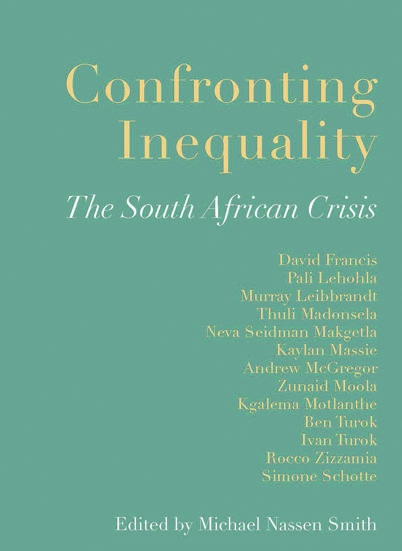Confronting Inequality: The South African Crisis edited by Michael Nassen Smith
Jacana Media
200 pages
R200
An insightful new book from the Institute for African Alternatives features a range of solutions-driven papers on SA’s inequality crisis, penned by the likes of Thuli Madonsela and Kgalema Motlanthe, as well as a range of experts on our economy and social challenges.
In this extract, activist and academic Ben Turok offers a big picture of where we find ourselves.
There is now a broad agreement that South Africa’s critical social problems lie in three areas – unemployment, poverty and inequality.
There is hardly a single report that does not give these issues priority. The unemployment problem is straightforward – jobs have to be created and the solutions are well understood.
Poverty is well documented, and we all know that poverty is a function of unemployment and that it can be alleviated by social grants.
But there is a limit, beyond which this all becomes unsustainable.
Dealing with inequality is a different matter because it is deeply embedded in the social structure of our society.
This is obviously a legacy of the rigours and discriminations of apartheid, at least in part.
Inequality cannot be addressed by welfare measures or even by taxation alone.
Inequality stares us in the face every way we turn in our daily lives. It is prominent where we work, where we live and, indeed, in every daily experience.
It is so great a part of our national experience that it is almost impossible to conceive of any measures we could take to remove its most obvious tentacles.
It is pervasive and undermines our efforts at nation-building. In some respects, gross class inequality is as undermining as racial discrimination, though, of course, the two are linked.
Even the World Bank, not renowned for giving salience to normative issues, has recently given much prominence to inequality.
In its report, Overcoming Poverty and Inequality in South Africa, the Word Bank notes: “South Africa is not only the most unequal country in the world but inequality has increased since the end of apartheid in 1994” (World Bank, 2018: xv). Moreover, “…between 1993 and 2015, inequality rose in South Africa, but fell in each region and the world” (World Bank, 2018: xv).
Even more concerning is that these international comparisons are based on consumption or income date where the Gini coefficient is 0.63.
But if inequality in wealth is considered, the Gini is 0.93, which means that inequality in South Africa is way beyond anything else seen in the world.
It is the wealth inequality that stares us in the face every day.
Here are the statistics:
It is such considerations that enable us to say that inequality is structural. It is therefore not open to remedies that are merely palliative, like social grants.
Indeed, how can it be when, “for about 76% of the population, poverty is a constant threat in their daily lives” (World Bank, 2018: xviii).
All this leads the report to an unusual finding: “Interventions that simultaneously stimulate growth and reduce inequalities are likely to have much more impact than interventions that only stimulate growth or only reduce inequalities [World Bank, 2018: xxvi].”
This is an important departure from the conventional economics of the Bretton Woods institutions, which normally simply promote growth as the solution to all problems. Our government needs to take note.
Much as we need foreign investment, much as we need our own private sector to invest the billions stored in the financial agencies and the JSE, this is not enough. We need conscious, deliberate measures to tackle inequality wherever it rears its ugly head. And that means everywhere.
We need to address the matter of the wealth tax. The Davis Tax Committee seems to be in favour of such a tax, but is delaying possible implementation for understandable reasons.
It is clear that the object is not necessarily to raise additional revenue.
There is a far more important reason – identified by French economist Thomas Piketty – and that is that we need to know the scale, location and forms of private wealth.
Read: The national minimum wage will make a difference to SA's inequality
For inexplicable reasons, the ANC Cabinet has never analysed wealth in South Africa, hence there is little data available in the SA Revenue Service or the Treasury about wealth.
We seem to be embarrassed to talk about the rich and what they do with their money.
The best we can do is to suggest that the rich pay enough taxes and that they are too few to make a difference anyway.
What is not explained is why there are such huge financial assets in unit trusts, life offices, retirement funds and the JSE.
And what about the huge funds that are steadily leaving the country? We find it strange that our universities have paid so little attention to these matters.
They seem to prefer the safer terrain of poverty studies, labour markets and the rest, important as they undoubtedly are.
A recent study by Nimrod Zalk suggests that the South African economy is fundamentally a high profit, low-investment economy (Zalk, 2017).
If that is indeed the case, it would explain the extraordinary divisions in our social makeup with a self-contained rich structure standing over a large poor structure.
Furthermore, there is evidence of low levels of movement between the two, despite the emergence of some rich black personnel.
The rise of the latter social group explains the fact that inequality among black Africans is now greater than in the population as a whole.
Finally, what is puzzling is why the achievement of democracy, which gave voice to the masses and protected the right to strike, has not led to the visible removal of the most obvious inequalities in our society.
In Europe, pressures from within the working class brought major social adjustments in capitalist countries. Why not in South Africa?




 Publications
Publications
 Partners
Partners









